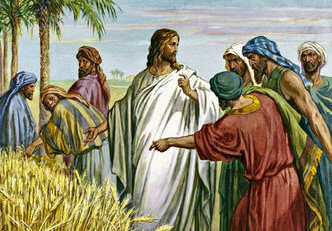
(Tuesday, January 21)
I remember reading a book written by an Episcopalian priest entitled, as I recall, “When God Becomes a Drug.” In this public confession he talked about how he became addicted to the “things of God”—especially the elaborate liturgical ceremonies over which he presided. Though he got emotional satisfaction being among the “things of God,” and being in the spotlight, he had a distaste for spending time alone with God in prayer. He confessed, that in spite of his priestly profession, deep inside he didn’t love the Lord God with his whole heart, soul, mind, and strength; it was himself and his emotional satisfaction that he loved more.
Today we read a story in which Jesus was confronted by the “religious addicts” of his day. It seems they were more in love with keeping and policing religious rules than they were with God himself (Mark2:23-28).
“As Jesus was passing through a field of grain on the Sabbath, his disciples began to make a path while picking the heads of grain. At this the Pharisees said to him, ‘Look, why are they doing what is unlawful on the Sabbath?”
God incarnate was present on earth. Jesus disciples were delighting in being in the presence of the one who set them free from their sins and opened them to a whole new vision of life. Focused on being with Jesus, they did not bother calling to mind the details of Sabbath rules. The Pharisees, on the other hand, were so focused on the Sabbath rules that they did not recognize the miraculous presence of God in their midst. We wonder how they happened to be on Jesus’ heels that day. Were they seeking forgiveness of sins and a deeper experience of God, or were they “checking out” this new rabbi who was attracting so much attention? Blinded by their preoccupation with religious rules, they missed the unique opportunity of meeting God himself, present in his Son.
Jesus corrected these men by citing a story in Scripture. Once, when David and his companions were hungry, they took the “bread of offering” meant only for the priests and ate it. David believed that the anointing he had from God superceded the liturgical rules. And so Jesus, the new David, had authority not only over religious rules and regulations but also over the Sabbath itself.
He then affirmed who he was by saying:
“The Sabbath was made for man, not man for the Sabbath. That is why the Son of Man is lord even of the Sabbath.”
Far above their preoccupation with the Sabbath, was the “Lord of the Sabbath.” All prescriptions of the law and religious rites and rules serve one purpose—to draw our attention to the living God and awaken a desire in us to love him with our whole hearts, souls, minds, and strength.
We humans are bent on making even the gifts of God into idols. Our professions, our possessions, our families, and even “religious activities” can become more important to us than our relationship with God. Sometimes God takes away one of our idols, so that in our emptiness we will seek him to fill us with his love. Spiritual writers remind us that “dryness in prayer” and “dark nights” come to help us detach from the consolations of God and seek more earnestly the God of all consolation.
Let us pray for the grace to let go of any obstacle that stands between us and a deeper relationship with Jesus, the Lord of the Sabbath.
“You have prepared a table before me…” (Ps 23:5).
